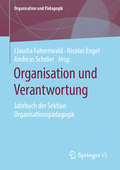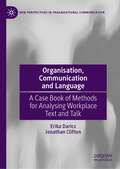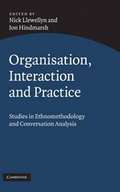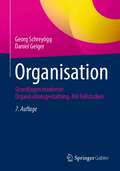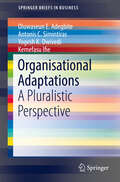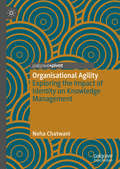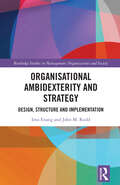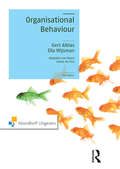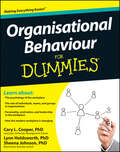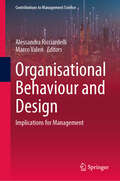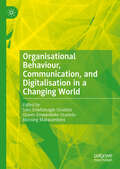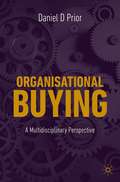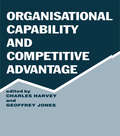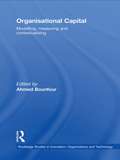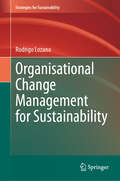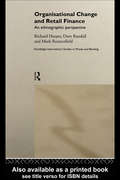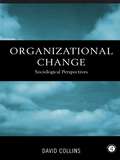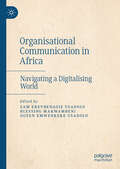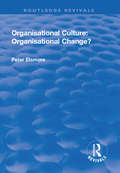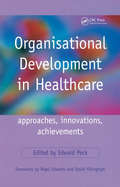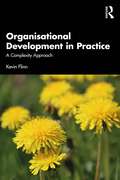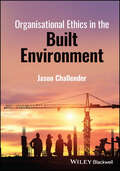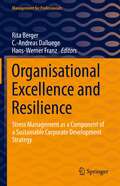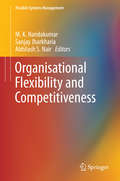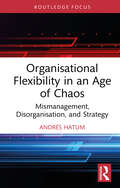- Table View
- List View
Organisation und Verantwortung: Jahrbuch der Sektion Organisationspädagogik (Organisation und Pädagogik #27)
by Nicolas Engel Andreas Schröer Claudia FahrenwaldDas Jahrbuch möchte in theoretischer, empirischer und pragmatischer Perspektive zur Klärung einer (organisations-)pädagogischen Verhältnisbestimmung von Organisation und Verantwortung beitragen. Im Rekurs auf die internationale und interdisziplinäre Diskussion zum Begriff der Verantwortung in seiner ethischen, gesellschaftlichen, politischen und pädagogischen Dimension werden organisationstheoretische Fragen und organisationspädagogische Heraus-forderungen bearbeitet. Die Beiträge beschäftigen sich mit dem Thema im Hinblick auf Rolle, Funktion(en) und Bedeutung von Verantwortung in, von und zwischen Organisationen als zentrale Träger des kulturellen und gesellschaftlichen Wandels. Über das Schwerpunktthema hinaus enthält das Buch weitere Beiträge zu aktuellen organisationspädagogischen Fragestellungen.
Organisation, Communication and Language: A Case Book of Methods for Analysing Workplace Text and Talk (New Perspectives in Organizational Communication)
by Erika Darics Jonathan CliftonThis book showcases various methodological approaches to the analysis of organizational talk and text. Arguing that organizations are discursive constructions that are communicatively constituted, the authors use the analysis of transcripts of audio-recordings of naturally-occurring workplace talk and authentic written texts to demonstrate what applied linguistics has to offer to scholarly research into organizations as well as management practice and training. The authors discuss the theoretical underpinnings of discursive approaches to the role language in the communicative constitution of organization, and then each chapter focuses on one particular analytical approach. The chapters cover conversation analysis; membership categorization analysis, positioning theory; ventriloquism; metaphor analysis; and metadiscourse analysis and computer-mediated discourse analysis. Consequently, this interdisciplinary work presents a number of methods that allow researchers unfamiliar with fine-grained linguistic analyses of naturally-occurring talk and text to explore ways of adding to their repertoire of research skills.
Organisation, Interaction and Practice
by Nick Llewellyn Jon HindmarshEthnomethodology has an elusive relationship with organisation studies. The ethnomethodological work of Harold Garfinkel, and the allied conversation analytic work of Harvey Sacks, is often cited and yet empirical contributions informed by ethnomethodology and conversation analysis remain rare. Organisation studies clearly has a lot to say about work but this is normally related to some broader set of social, economic and political issues. Rarely, if ever, does this research involve an analysis of the mundane and practical details of what actual work consists of. This book acts as an evidence-based corrective by showing how research based on ethnomethodology and conversation analysis can contribute to key issues and debates in organisation studies. Drawing on audio/video recordings from a diverse range of work settings, a team of leading scholars present a series of empirical studies that illustrate the importance of paying attention to the real-time achievement of organisational processes and practices.
Organisation: Grundlagen moderner Organisationsgestaltung. Mit Fallstudien (Veröffentlichungen Des Instituts Für Deutsches, Europäisches Und Internationales Medizinrecht, Gesundheitsrecht Und Bioethik Der Universitäten Heidelberg Und Mannheim Ser. #25)
by Georg Schreyögg Daniel GeigerDidaktisch gekonnt aufbereitet stellen Georg Schreyögg und Daniel Geiger Konzepte und Methoden zum Verständnis der Probleme der Organisationsgestaltung und zur Entwicklung fundierter Lösungen vor. Zahlreiche aktuelle Fallbeispiele illustrieren die Ansätze und regen zur praktischen Anwendung des theoretischen Wissens an. Diskussionsfragen dienen der Vertiefung des Gelernten.Für die siebte Auflage wurde das Lehrbuch aktualisiert und gestrafft, die Reihenfolge der Kapitel wurde umgestellt, die didaktisch bewährte Grundkonzeption wurde jedoch erhalten.
Organisational Adaptations: A Pluralistic Perspective (SpringerBriefs in Business)
by Yogesh K. Dwivedi Antonis C. Simintiras Oluwaseun E. Adegbite Kemefasu IfieThis book explores how enterprises adapt to challenges in their business environments. It focuses on the critical elements within organisations that every executive must address in order to remain competitive. It takes a pluralist approach in trying to broaden our knowledge on organisational adaptations. It also offers an exploratory delve into existing literature of organisational study. This is biased for content, context and process framework and processual analytic approach in order to identify, determine, understand the intricacies of adaptations going on in various business organisations. The book also includes a case study of how Kodak and Fujifilm responded to digitalisation of photographic film industry, which is an example of major adaptation change. Many global brands are often contending with similar issues and real life challenges. Simply put, today’s business environment demands a new way of doing business that challenges brand’s existing core business philosophy.Organisations are ‘individual’ entities in their own rights. Businesses have devised ways of surviving their environments. They do this by downsizing, merger and acquisition, business ecosystems, other forms of collaborations and strategic alliances. While this is true, current research works into generic predictors and/or concepts that enhance the transformation process are scarce. It is particularly important to align the theories and concepts of organisational adaptations with realities in the business environment. This book delves deep and explains adaptations in organisations, but also offers insight for how executives can adapt and thrive in their dynamic business environments.
Organisational Agility: Exploring the Impact of Identity on Knowledge Management
by Neha ChatwaniThe agility paradigm suggests that knowledge management is central to an organisations’ capability to proactively anticipate environmental changes and respond to them effectively. This book specifically explores how organisational identity impacts knowledge flows within an organisation, influencing and negotiating its responsiveness. By looking at agility through the identity lens the author takes a cross-disciplinary approach that aims at offering a new and important perspective towards our current understanding of change management and in particular, of the agility model, making this book a valuable resource for students, researchers and practitioners.
Organisational Ambidexterity and Strategy: Design, Structure and Implementation (Routledge Studies in Management, Organizations and Society)
by Imo Enang John M. RuddAcross the last 50 years, there have been increasing studies on Organizational Ambidexterity (OA). However, there has been a disproportionate focus on the theory underpinning OA with less recourse to the implementation of OA. The primary purpose of this book is to close gaps in the understanding of Organizational Ambidexterity Implementation (OAI) and its relationship with organizational performance. It identifies key components crucial for successful OAI, including dynamic capabilities, organizational culture, organizational design and market orientation. The scope encompasses both qualitative and quantitative analysis, investigating the factors that drive or obstruct OAI and assessing performance disparities among organizations. This book is intended for academics, researchers, and professionals interested in corporate strategy with focus on the management of organizational resources and capabilities within organizational structure and design for performance improvement. It serves as a valuable resource for those seeking to understand how organizational culture, dynamic capabilities, market orientation, and design impact the successful implementation of ambidexterity and, consequently, overall organizational performance. Additionally, business leaders and managers can gain insights to help their organizations evaluate and enhance their abilities in these critical areas, ultimately fostering a culture of innovation and efficiency.
Organisational Behaviour
by Gert Alblas Ella Wijsman Marjolein van NoortOrganisational Behaviour is an introduction to understanding behaviour of people in organisations and discusses this behaviour for working in and managing an organisation. Subjects discussed include: Motivating and influencing people Group behaviour Communication and handling information Power and leadership Decision making Structuring organisations Organisational culture and managing change Managing stress and conflicts
Organisational Behaviour For Dummies
by Cary L. Cooper Lynn Holdsworth Sheena JohnsonYour plain-English introduction to organisational behaviourOrganisational Behaviour (OB) is the study of how people, individuals, and groups act in organisations. Whether you're studying OB, or you just want a better understanding of people at work, Organisational Behaviour For Dummies gives you all the essentials for understanding this fascinating subject.Inside you'll find out about personality and individual differences, teams and groups, personnel selection and assessment, and health and well-being at work. You'll also find out how leaders lead, how motivators motivate, and how the modern workplace is changing and evolving.An easy-to-read introduction to organisational behaviour for business, management, and organisational psychology studentsA useful reference for managersA fascinating look at behaviour in the modern workplaceWhether you're a student of organisational behaviour, a manager, or a lifelong learner with an interest in human behaviour and psychology in the workplace, Organisational Behaviour For Dummies has you covered.
Organisational Behaviour and Design: Implications for Management (Contributions to Management Science)
by Alessandra Ricciardelli Marco ValeriThis book focuses on conceptual frameworks, debates, tools and developments in the fields of organizational behaviour and organizational design. It analyses the concepts related to organizational behaviour such as leadership, organizational climate, and motivation, at one side, and focuses on the general framework for organizational design in detail in all its components (strategy, environment, processes, people, leadership, information and knowledge system etc.), at the other side. The analysis of the psychological factors affecting organizational design also drives to think of possible different configurations of the main components of organizational structure and design that may be a good fit/alignment between behaviour and design. In the Industry 4.0 era, human resources and personal factors are increasingly central and strategic therefore it is important to understand how psychological factors affect organizational design. It provides a practical guidance on this area of study for developing and implementing the desired organizational architecture. Hence, it takes a managerial perspective to identify practices and behaviour resulting in meaningful and satisfying organizational experience vis-à-vis the evolving nature of structures and contexts. The book broadens readers’ understanding of the role of organizational behavior and design issues in organizational performance while focusing on design changes to remedy organization's core problems. Given these premises, it will be of interest to scholars and professionals in the field of organizational behaviour, job design and job crafting, strategic management and studies at large who can contribute to organizations' evolution towards more harmonious organizational design configurations.
Organisational Behaviour, Communication, and Digitalisation in a Changing World
by Sam Erevbenagie Usadolo Blessing Makwambeni Queen Emwenkeke UsadoloThis book brings together leading scholars and practitioners in organizational behaviour and communication to explore the complex relationship between employees and their organisations and the associated workplace outcomes. This comprehensive volume provides insights, theories, and practical strategies to understand and address the multifaceted nature of organisational dynamics in the face of constant and accelerated change. The first section of the book delves into the theoretical foundations of organisational behaviour. Some of the contributors in this section offer a comprehensive analysis of the socio-cultural and psychological aspects that influence individual behaviour within organisations. Building upon this foundation, the subsequent sections of the book examine various dimensions of organisational behaviour, including leadership, teamwork, diversity, and conflict resolution. One of the focuses of this edited volume is the examination of emerging technologies and their effects on the operation of organisations. Hence, some of the chapters examine the management of employee-organisations using digital platforms and explore employee engagement, collaboration, the effect of organisational support, supervisor support, or lack thereof. By delving into the role of digital technologies in the context of a changing world, the book offers valuable insights into the development of contemporary organisations, especially how technology is leveraged to foster a sense of connectivity in dispersed work environments.
Organisational Buying: A Multidisciplinary Perspective
by Daniel D PriorOrganisational buying is the purchase of goods and/ or services, by one or more individuals acting on behalf of the buyer firm, after a formal or informal consideration of purchase alternatives, and, the integration or use of those goods and/ or services to address one or more buyer firm problems or issues. Organisational buying accounts for about two-thirds of economic transactions globally. However, organisational buying has traditionally been taught in discipline-specific silos. Organisational buying concepts appear in courses on marketing and sales management, procurement, contract management, supply chain management, operations management, finance, as well as accounting. Moreover, most organisations treat organisational buying activities in a similarly disjointed way.This book provides a comprehensive overview of organisational buying that integrates perspectives from across a range of disciplines and organisational functions. The primary goal of the book is to develop a holistic interpretation of organisational buying. It covers topics such as:• Purchase situations.• The organisational buying process.• The purchase decision and the value proposition.• Communications in organisational buying. • Buyer-supplier relationships.• Organisational buying capabilities.• Organisational buying culture.• Organisational buying approach design.• Channels of supply.• Networks and organisational buying.Written in a practical, approachable way the book includes a range of exercises, case examples, learning objectives and discussion questions to support a broad spectrum of organisational buying-related courses.
Organisational Capability and Competitive Advantage
by Charles Harvey Geoffrey JonesFirst Published in 1992. Routledge is an imprint of Taylor & Francis, an informa company.
Organisational Capital: Modelling, Measuring and Contextualising (Routledge Studies in Innovation, Organizations and Technology)
by Ahmed BounfourThere is much debate as to how companies carry out their activities in the context of new information and communication technologies influencing organizations to decentralize and develop new managerial practises including outsourcing and networking. Recent theories have emphasized the importance of organization as a key component for building corporate competitive advantage and scholars have looked at this from a range of perspectives including in relation to intangible assets, human capital, work training and the process dimension. Yet the concept of organisational capital as such – in spite of its indubitable relevance and attractiveness- is still to be clarified until now. In this book the subject is approached in four ways. Firstly from an analytical perspective: what is the status of organisational capital as a concept and how is the defined; secondly from a ontological perspective: what type of (implicit) orders can be designed and implemented around organisations; thirdly from the measurement perspective: what kind of frameworks and what type of metrics can be prototyped; and finally the implementation perspective: how should organizations integrate the organisational capital perspective in the definition and implementation of their strategies for resources’ allocation. The book provides the first multifaceted and international effort from a broad perspective, aiming at clarifying the concept of organisational capital and determining its analytical and operational implications.
Organisational Change Management for Sustainability (Strategies for Sustainability)
by Rodrigo LozanoThis book is aimed at providing clarity through a systemic and systematic approach to organisational change management for sustainability. Chapter 2 of the provides an overview of sustainable development and sustainability discourses, focussing on the economic, environmental, social, and time dimensions, as well as their interactions. Chapter 3 explains what organisations are, the types of organisations (civil society, corporations, education, public sector, and hybrid), the levels and system elements (individuals, groups, organisation, and system), attitudes (informational, emotional, and behavioural), the stakeholders that affect and are affected by the organisation, and the interactions between organisations (from competition to collaboration). Chapter 4 focuses on how organisations have been addressing sustainability, divided into 1) efforts to contribute to sustainability (i.e. focussing outside the organisation), and 2) engagement efforts (i.e. those focussing inside the organisation, e.g. through the use of tools, initiatives, and approaches for sustainability, and collaboration). Chapter 5 discusses change, types of change (internal vs. external, proactive vs. reactive, etc.), change strategies, change frameworks, and change for sustainability in organisations. Chapter 6 focusses on three key mechanisms for sustainability: Leadership, Governance, and Assessment and reporting (with examples from Higher Education Institutions, corporations, and public sector organisations). Chapter 7 discusses on the different drivers (internal, connecting, and external) that foster sustainability in organisations. Examples from empirical research are presented. Chapter 8 delves into resistance to change, particularly on the barriers that slow down or stop sustainability in organisations, as well as the strategies to overcome the barriers to change. Examples from empirical research are presented. The seventh chapter focuses on the different strategies that help reduce or eliminate resistance to sustainability in organisations. Examples from empirical research are presented. Chapter 9 focusses on where sustainability efforts have started (incorporation) and how have they been adopted throughout the organisation (institutionalisation). Examples from empirical research are presented. Chapter 10 presents the effects of external stimuli, such as COVID-19 on organisational change management for sustainability.
Organisational Change and Retail Finance: An Ethnographic Perspective (Routledge International Studies in Money and Banking #Vol. 8)
by David Randall Richard Harper Mark RouncefieldFinancial organizations, like many others, are undergoing radical change. This is affecting both their organizational processes and the technology that supports those processes. This book reports on the use of sociological ethnography in helping guide these changes, both in terms of helping better understanding and redraw work processes and through providing more accurate and flexible understanding of the role technology plays. It places the reported research in context by contrasting it with those approaches more commonly associated with change, including business process engineering, participative design and soft systems methodologies. The book explains what are the benefits of ethnography, as well as the potential it has in helping achieve more desirable change in any and all organizations, financial services included. The book will be of interest to all international researchers concerned with organizational and technological change, as well as managers of organisational development. It will also interest advanced students in sociology, anthropology, management science and organizational studies The authors have published widely in the various disciplines associated with organizational life and technology design, and have built a considerable reputation for bringing new sociological insights into the organizational change literature
Organisational Change: Sociological Perspectives
by David CollinsIn recent years, there has been an explosion of books on the nature of organisational change and the management skills needed to effectively carry it out. Many are written by change gurus and management consultants offering quick fixes and metaphor laden business toolkits, however, much of their advice is banal and under-theorized. This book redresses this balance by providing an original analysis of change management in organizations in the light of wider sociological perspectives. It critically examines the, often implicit, theoretical frameworks underpinning many contemporary accounts of organizational change, and covers subjects including: * the importance of explicit analysis of theory and context* a critique of populist management gurus and quick-fix 'how-to' solutions* 'under-socialized' models of change which emphasise structure over human action* trenchant analysis of 'soft' HRM solutions* the management of culture.Radical and innovative, this book, the first to adopt a sociological approach, is a much-needed challenge to the orthodoxies of change management.
Organisational Communication in Africa: Navigating a Digitalising World
by Sam Erevbenagie Usadolo Blessing Makwambeni Queen Emwenkeke UsadoloThis book delves comprehensively into organisational communication in Africa in the digital age, alongside other organisational changes. This makes it a valuable resource for scholars, practitioners, and students in organisational communication, corporate communication, public relations, and development communication – both within Africa and across the globe. Through diverse perspectives and evidence-based insights, the book equips readers with the knowledge and tools needed to navigate the ever-changing organisational landscape and achieve success in our rapidly evolving world.
Organisational Culture: Organisational Change? (Routledge Revivals)
by Peter ElsmoreThis title was first published in 2001. When organizational change occurs, members of the organization can feel insecure in the face of a seemingly uncertain future. This work investigates the links between organizational culture and organizational change by looking at two businesses that have been privatized - British Gas and British Telecom - and the processes surrounding the ways these organizations changed in the mid 1990s. It includes interviews with middle-ranking and senior officals, illustrating that anguish is experienced not only by those on the lower rungs of the corporate ladder.
Organisational Development in Healthcare: Approaches, Innovations, Achievements
by Edward PeckOrganisational Development in Healthcare introduces the practical ways in which change in health services can be promoted. It includes descriptions of all of the most important approaches to change currently being used in the NHS, discussion of when they work best and details of the evidence of their impact.
Organisational Development in Practice: A Complexity Approach
by Kevin FlinnOrganisational Development in Practice: A Complexity Approach draws on conventional, critical, and complexity thinking in relation to organisational development with a view to exploring what’s useful and what’s not.This book proffers an approach to organisational development that helps to develop, support, and maintain more democratic, collaborative, inclusive and sustainable ways of learning, working, and living. The author explores the practicalities of working with the frustrations and inconsistencies involved in coping with the patterns of human interaction that inevitably make up organisations, where planned and emergent approaches co-exist, whether we would like them to or not. Woven in between the personal essays are vignettes from a range of international practitioners reflecting on their own experiences in the field.This book, a radically different approach to organisational development, is suitable for advanced students and researchers of organisation and organisational development, organisation studies, human resource management, and executive education. It will also be of interest to practising managers.
Organisational Ethics in the Built Environment
by Jason ChallenderOrganisational Ethics in the Built Environment A comprehensive analysis of the critical role played by ethics in construction organisations, and a toolkit for implementing a strong ethical culture In Organisational Ethics in the Built Environment, accomplished construction leader Jason Challender delivers an insightful and important resource for construction industry professionals contributing to the creation of safe and suitable projects. The author explains how to construct the foundation for ethical building and business practices in the construction industry, and explores the methods, motives and rationales behind successful and ethical projects from an organisational and industry perspective. You’ll learn how practical improvements to organisational ethics can promote ethical standards, behaviours and practices and influence the success of projects in the built environment. You’ll also discover the importance of leadership, motivational management, human resource management, corporate responsibility and social value in encouraging strict compliance and adherence to ethical principles, values and standards within organisations. Readers will also find: A thorough introduction to the critical importance of trust, collaborative working and partnering arrangements in contemporary construction and engineering organisations Comprehensive explorations of the relevance of environmental ethics Practical discussions of how to link corporate policies and strategies to ethical guidelines Case studies from across a variety of knowledge fields, including manufacturing and retail Perfect for construction managers, Organisational Ethics in the Built Environment will also benefit undergraduate and postgraduate students of construction, business, management, engineering and other construction related subjects.
Organisational Excellence and Resilience: Stress Management as a Component of a Sustainable Corporate Development Strategy (Management for Professionals)
by Hans-Werner Franz Rita Berger C. Andreas DalluegePersonal stress has an enormous impact on organizational and employee performance. This book introduces the web-based diagnostic tool IMPRESS, which provides employees, managers and HR professionals with information about potential stress factors. The book describes the underlying methodology for this integrated approach and presents the tools and learning modules to support the methodology. A series of case studies from pilot implementations in companies and universities illustrate the application of the approach in a variety of work environments. The book is based on an international research project for a holistic approach to stress prevention by combining Human Systems Audit with the European Excellence approach as promoted by the Common Assessment Framework (CAF) and the EFQM Excellence Model. This approach is intended to contribute to organizational development that supports effective employee stress management.
Organisational Flexibility and Competitiveness
by M. K. Nandakumar Sanjay Jharkharia Abhilash S. NairThe proposed book is intended to provide a conceptual framework of 'Organisational Flexibility and Competitiveness' supported by research studies in various types of flexibilities exhibited by an organisation. The need for enterprise flexibility in an era of rapidly advancing technology, increasing competition, and globalization, is apparent. Flexibility can be thought of as an ability of the enterprise to quickly and efficiently respond to market changes and to bring new products and services quickly to the market place. Beyond this definition, a truly flexible enterprise should proactively change the market through its ability to create truly new and innovative products and services. The book applies the concept of flexibility to various functional areas: strategy and competitiveness, organization and HR management, information systems, finance and risk management, operations and supply chain management.
Organisational Flexibility in an Age of Chaos: Mismanagement, Disorganisation, and Strategy (Routledge Focus on Business and Management)
by Andrés HatumThis groundbreaking book challenges conventional management wisdom by arguing that mismanagement and disorganisation are not failures but endemic features of organisational life in turbulent times. Through rigorous theoretical analysis and rich case studies, including an in-depth examination of Netflix, the author develops a comprehensive framework of organisational flexibility based on five key dimensions that enable companies to thrive amid chaos and uncertainty. The book offers several distinctive features: A provocative reconceptualisation of organisational adaptation; an empirically grounded framework for building flexible organisations; practical diagnostic tools for assessing and enhancing organisational adaptability; and detailed case studies that illuminate how successful organisations navigate complexity. Each chapter combines theoretical depth with practical insights, making complex concepts accessible while maintaining scholarly rigor. Written primarily for academics and researchers in organisation studies, strategic management, and leadership theory, this book will particularly appeal to doctoral students and advanced postgraduate scholars. It serves as an essential resource for management faculty teaching graduate courses in organisational behaviour, strategic change, and leadership, while also offering valuable insights for researchers studying organisational adaptation in volatile environments.
